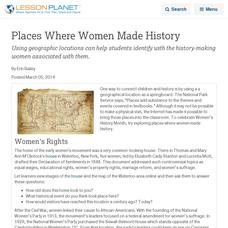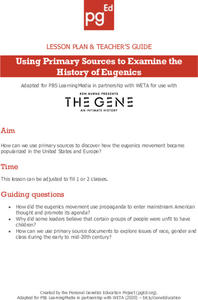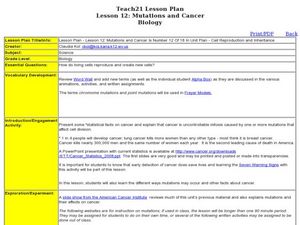Curated OER
Ancient Hunters of the Great Lakes
Students describe theories on how the first humans came to America and show the evidence that supports it. In this investigative lesson students study given material and prepare written or oral reports in their groups.
Curated OER
A Country of Migrants?
High schoolers list reasons in support or rejection of the United States being a country of migrants through a written statement and discussion. They answer questions posed regarding immigration.
Curated OER
What is Migration
Young scholars conduct individual research and participate in discussion be able to identify difference between forced and voluntary migration. They identify if push and pull factors are caused by political, social, economic, or...
Curated OER
Meet the Underground Railroad
Young scholars research and learn about the Underground Railroad. In this Underground Railroad lesson plan, students take 2 weeks to research an individual, complete journal writings, read passages in small groups, list major events, and...
Curated OER
Vermont History True / False
In this Vermont history worksheet, students read two and a half pages of information about Vermont history. After reading, students complete 10 true or false questions about what they read.
Curated OER
I Have No Money, Would You Take Wampum
Students engage in a discussion about their experiences with goods, services, and money. For this bartering lesson, students read The Wampum Bird story and brainstorm their personal experiences with economics.
Japan Society
Popular Culture and Japan’s Gross National Cool
From Manga to Godzilla and Pokemon, Japanese pop culture has been taking the globe by storm. This phenomenon is called "soft power." Learners will examine the differences between hard and soft power, as well as learn the historical...
Curated OER
Places Where Women Made History
Using places can help students identify with the history-making women associated with them.
Curated OER
Noncombatancy and the Seventh day Adventist Church
Upper graders investigate how the Seventh Day Adventists are objectors to the practice of war. The lesson covers the Civil War and examines the church's position about the practice of war. The research extends to modern wars and learners...
Curated OER
Writing Women: The Yellow Wallpaper
High schoolers examine the historical, social, cultural and economic context of Charlotte Perkins Gilman's story, The Yellow Wallpaper. Students determine the place of the middle class woman and her role in society.
Curated OER
What Did it Look Like When Europe Met America?
Learners view the film 'Black Robe,' which further develop students' abilities to see an event or era of history from multiple perspectives. After the movie, they utilize worksheets imbedded in this plan to write about what they've seen.
Personal Genetics Education Project
Using Primary Sources to Examine the History of Eugenics
Eugenics philosophy takes survival of the fittest to a whole new level. With a research-focused lesson, young scientists examine the history of the eugenics movement and its impact on society. Pupils engage with a video clip, primary...
Alabama Department of Archives and History
Alabama Tenant Farmers and Sharecroppers, 1865 to Present
The tenant farming and sharecropping systems that developed in the South after the Civil War, the reasons for their development, and the eventual decline of these systems are the focus of this two-day plan.
Museum of Tolerance
Disenfranchised People of the New Nation
Why are some immigrant groups in the United States embraced while others become disenfranchised? To answer this question, teams investigate why groups emigrated to the US, why some of these these peoples were...
Smithsonian Institution
Comparing Confederate and Union Soldiers
The Civil War, a war that divided a nation. Comparing and contrasting the Confederate and Union soldiers is not always an easy task, but the eighth of 15 resources makes it easy to teach the concepts. Exercises include watching videos in...
Curated OER
Mutations and Cancer
Students study how cancer cells mutate and affect cell division. In this investigative lesson students view a PowerPoint presentation learn the seven warning signs of cancer.
Missouri Department of Elementary
Equine Science
Did you know that horses have two sets of teeth? There is much to learn about horses, of course, and those interested in equine science will learn much from a 10-lesson agricultural science course that covers not only equine dental...
Boston University
South African Short Stories: Apartheid, Civil Rights, and You
How are short stories from South Africa connected to issues of civil rights in the United States? A unit plan uses South African short stories to discuss issues such as apartheid, colonization, and civil rights. Questions and activities...
Curated OER
Roots of the Documents of Freedom
Learners examine and analyze various excerpts from documents of freedom such as Magna Carta and Virginia Declaration of Rights, identify how documents influenced each other, and discuss ideas and rights necessary to build representative...
Curated OER
Now's the Time to Learn About the Ancient Greek Olympics
You can take advantage of the history of the Olympic Games to teach about the contributions of the Ancient Greeks.
Curated OER
Corn An A-Maizing Plant
Fifth graders consider the uses of corn. In this agricultural lesson, 5th graders examine corn as a natural resource and discuss the many ways to reuse the grain. A variety of activities, books, and web resources are included...
Curated OER
Indentured Servitude and Immigration
Students examine indentured servitude. In this Teaching Tolerance lesson, students compare indentured servitude of colonial America to the undocumented immigration of today. Students write reflections regarding how they feel about...
Curated OER
Bill of Right in Action
Groups reserach and write about topics given to them by their teacher dealing with the Bill of Rights.
Curated OER
Into a New Millennium, Lesson 4: 1970 to Present
Students view different slides on how agriculture has changed in America. In groups, they are given one resource to read and answer discussion quesions. After reviewing answers, they participate in different scenerios to help protect...

























